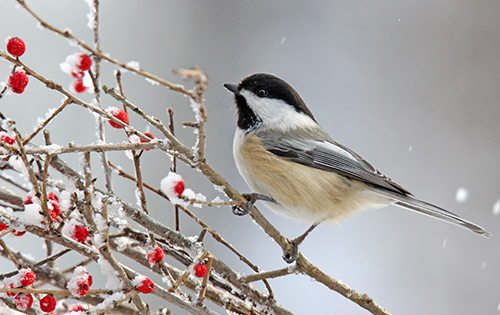Feeding the Spirit of Christmas
Dec 12, 2023

As the holiday season blankets Tennessee in a festive glow, there’s a meaningful way to celebrate the magic of Christmas — by extending a caring hand to our feathered friends. Feeding birds in the winter requires a thoughtful selection of bird feed to ensure they receive the necessary nutrients to endure the colder months.
Different bird species have varied dietary preferences, so offering a diverse menu can attract a wider array of feathered visitors. Keep reading for a list of the most popular types of bird feed used during the winter.
Black Oil Sunflower Seeds
Safflower Seeds
Nyjer (Thistle) Seeds
Peanuts
Suet
Mixed Seed Blends
Mealworms
Cracked Corn
Fruit
When setting up your bird feeders, it’s important to provide a variety of these feeds to cater to different species. Additionally, ensuring a fresh water source is crucial, as water can be scarce in winter and is essential for both drinking and bathing. Experiment with different combinations to see which ones attract the most diverse and colorful array of birds to your winter-feeding station.
Your local Co-op has everything you need to keep your wild birds happy and healthy, including bird feeders, birdhouses, and a wide variety of seeds. Come stock up for the winter season and remember the joy that comes from giving and sharing with all creatures, great and small. Find the nearest location here.
For more content like this, check out the latest issue of The Cooperator.
Different bird species have varied dietary preferences, so offering a diverse menu can attract a wider array of feathered visitors. Keep reading for a list of the most popular types of bird feed used during the winter.
Black Oil Sunflower Seeds
- Birds Attracted: Cardinals, chickadees, finches, nuthatches, and sparrows.
- Benefits: These seeds have a high oil content, providing essential energy for birds to stay warm in the winter.
Safflower Seeds
- Birds Attracted: Cardinals, chickadees, doves, and grosbeaks.
- Benefits: Safflower seeds are an excellent option if you want to discourage squirrels, as they have a bitter taste that many mammals find unappealing.
Nyjer (Thistle) Seeds
- Birds Attracted: Goldfinches, house finches, chickadees, and siskins.
- Benefits: These tiny, oil-rich seeds are a favorite among finches and other small birds.
Peanuts
- Birds Attracted: Woodpeckers, nuthatches, jays, and chickadees.
- Benefits: Peanuts are a great source of protein and healthy fats, providing birds with essential nutrients.
Suet
- Birds Attracted: Woodpeckers, nuthatches, chickadees, and titmice.
- Benefits: Suet is a high-energy food, especially important during colder months when birds need extra calories to maintain body heat.
Mixed Seed Blends
- Birds Attracted: Varied, depending on the mix.
- Benefits: Mixed seed blends offer a diverse range of seeds, attracting a wide variety of birds. Look for blends without excessive fillers.
Mealworms
- Birds Attracted: Bluebirds, robins, wrens, and thrushes.
- Benefits: Mealworms are a protein-rich option, especially valuable when insects are scarce in winter.
Cracked Corn
- Birds Attracted: Doves, sparrows, juncos, and towhees.
- Benefits: Cracked corn is a good source of carbohydrates and can be scattered on the ground for ground-feeding birds.
Fruit
- Birds Attracted: Orioles, thrushes, and waxwings.
- Benefits: Offering slices of apples or berries provide birds with essential vitamins and minerals.
When setting up your bird feeders, it’s important to provide a variety of these feeds to cater to different species. Additionally, ensuring a fresh water source is crucial, as water can be scarce in winter and is essential for both drinking and bathing. Experiment with different combinations to see which ones attract the most diverse and colorful array of birds to your winter-feeding station.
Your local Co-op has everything you need to keep your wild birds happy and healthy, including bird feeders, birdhouses, and a wide variety of seeds. Come stock up for the winter season and remember the joy that comes from giving and sharing with all creatures, great and small. Find the nearest location here.
For more content like this, check out the latest issue of The Cooperator.